ESBM P1: Examining Entrepreneurial Ventures and Their Typology
VerifiedAdded on 2024/05/20
|7
|1251
|474
AI Summary
This document explores different types of entrepreneurial ventures, including skeptical, copycat, researched, and determined entrepreneurship. It examines how these types relate to the typology of entrepreneurship ventures, such as small-scale business, scalable startups, large companies, and social ventures. The document also evaluates the similarities and differences between social entrepreneurship and lifestyle entrepreneurship, highlighting their unique characteristics and motivations.
Contribute Materials
Your contribution can guide someone’s learning journey. Share your
documents today.

[ESBM]
18
18
Secure Best Marks with AI Grader
Need help grading? Try our AI Grader for instant feedback on your assignments.
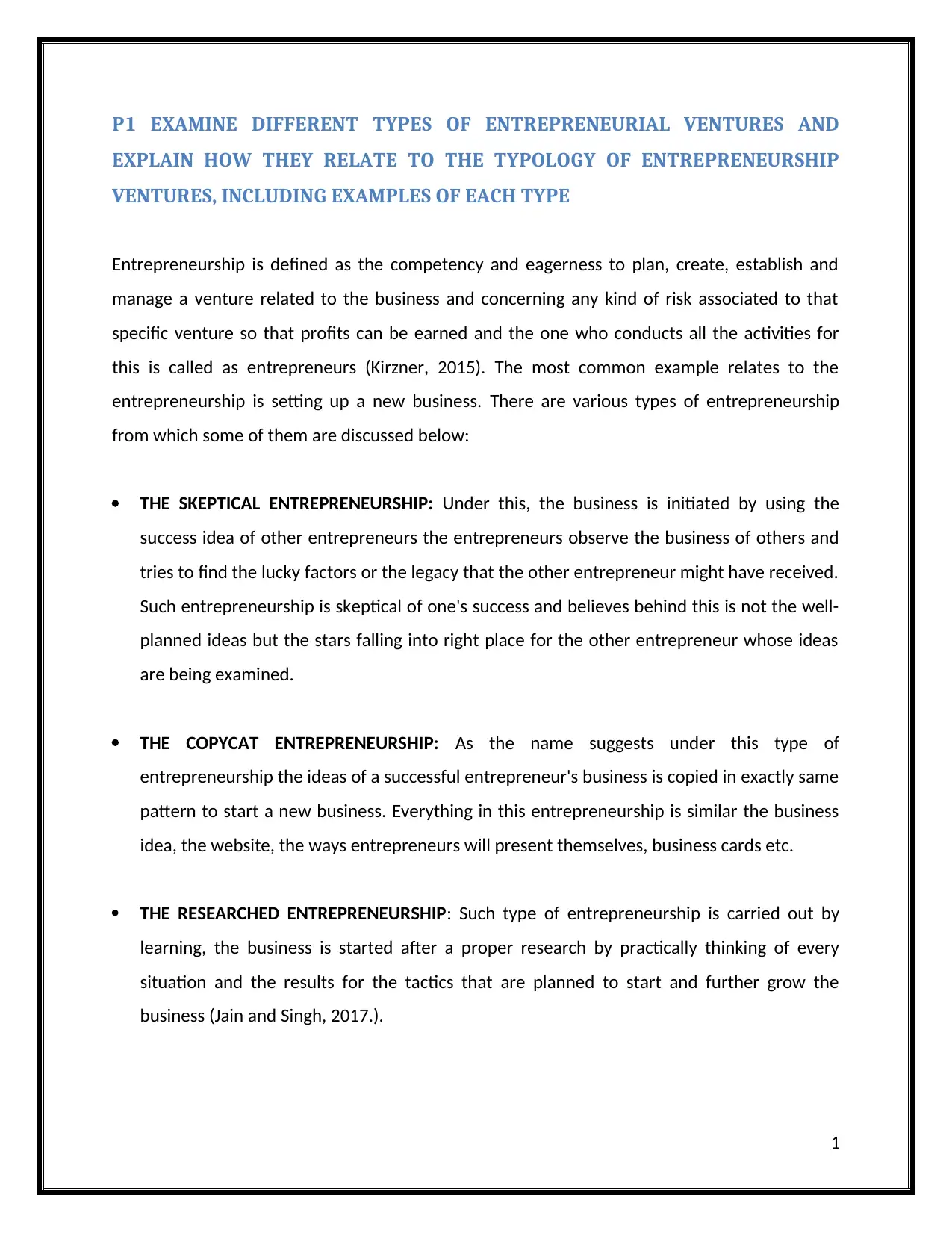
P1 EXAMINE DIFFERENT TYPES OF ENTREPRENEURIAL VENTURES AND
EXPLAIN HOW THEY RELATE TO THE TYPOLOGY OF ENTREPRENEURSHIP
VENTURES, INCLUDING EXAMPLES OF EACH TYPE
Entrepreneurship is defined as the competency and eagerness to plan, create, establish and
manage a venture related to the business and concerning any kind of risk associated to that
specific venture so that profits can be earned and the one who conducts all the activities for
this is called as entrepreneurs (Kirzner, 2015). The most common example relates to the
entrepreneurship is setting up a new business. There are various types of entrepreneurship
from which some of them are discussed below:
THE SKEPTICAL ENTREPRENEURSHIP: Under this, the business is initiated by using the
success idea of other entrepreneurs the entrepreneurs observe the business of others and
tries to find the lucky factors or the legacy that the other entrepreneur might have received.
Such entrepreneurship is skeptical of one's success and believes behind this is not the well-
planned ideas but the stars falling into right place for the other entrepreneur whose ideas
are being examined.
THE COPYCAT ENTREPRENEURSHIP: As the name suggests under this type of
entrepreneurship the ideas of a successful entrepreneur's business is copied in exactly same
pattern to start a new business. Everything in this entrepreneurship is similar the business
idea, the website, the ways entrepreneurs will present themselves, business cards etc.
THE RESEARCHED ENTREPRENEURSHIP: Such type of entrepreneurship is carried out by
learning, the business is started after a proper research by practically thinking of every
situation and the results for the tactics that are planned to start and further grow the
business (Jain and Singh, 2017.).
1
EXPLAIN HOW THEY RELATE TO THE TYPOLOGY OF ENTREPRENEURSHIP
VENTURES, INCLUDING EXAMPLES OF EACH TYPE
Entrepreneurship is defined as the competency and eagerness to plan, create, establish and
manage a venture related to the business and concerning any kind of risk associated to that
specific venture so that profits can be earned and the one who conducts all the activities for
this is called as entrepreneurs (Kirzner, 2015). The most common example relates to the
entrepreneurship is setting up a new business. There are various types of entrepreneurship
from which some of them are discussed below:
THE SKEPTICAL ENTREPRENEURSHIP: Under this, the business is initiated by using the
success idea of other entrepreneurs the entrepreneurs observe the business of others and
tries to find the lucky factors or the legacy that the other entrepreneur might have received.
Such entrepreneurship is skeptical of one's success and believes behind this is not the well-
planned ideas but the stars falling into right place for the other entrepreneur whose ideas
are being examined.
THE COPYCAT ENTREPRENEURSHIP: As the name suggests under this type of
entrepreneurship the ideas of a successful entrepreneur's business is copied in exactly same
pattern to start a new business. Everything in this entrepreneurship is similar the business
idea, the website, the ways entrepreneurs will present themselves, business cards etc.
THE RESEARCHED ENTREPRENEURSHIP: Such type of entrepreneurship is carried out by
learning, the business is started after a proper research by practically thinking of every
situation and the results for the tactics that are planned to start and further grow the
business (Jain and Singh, 2017.).
1
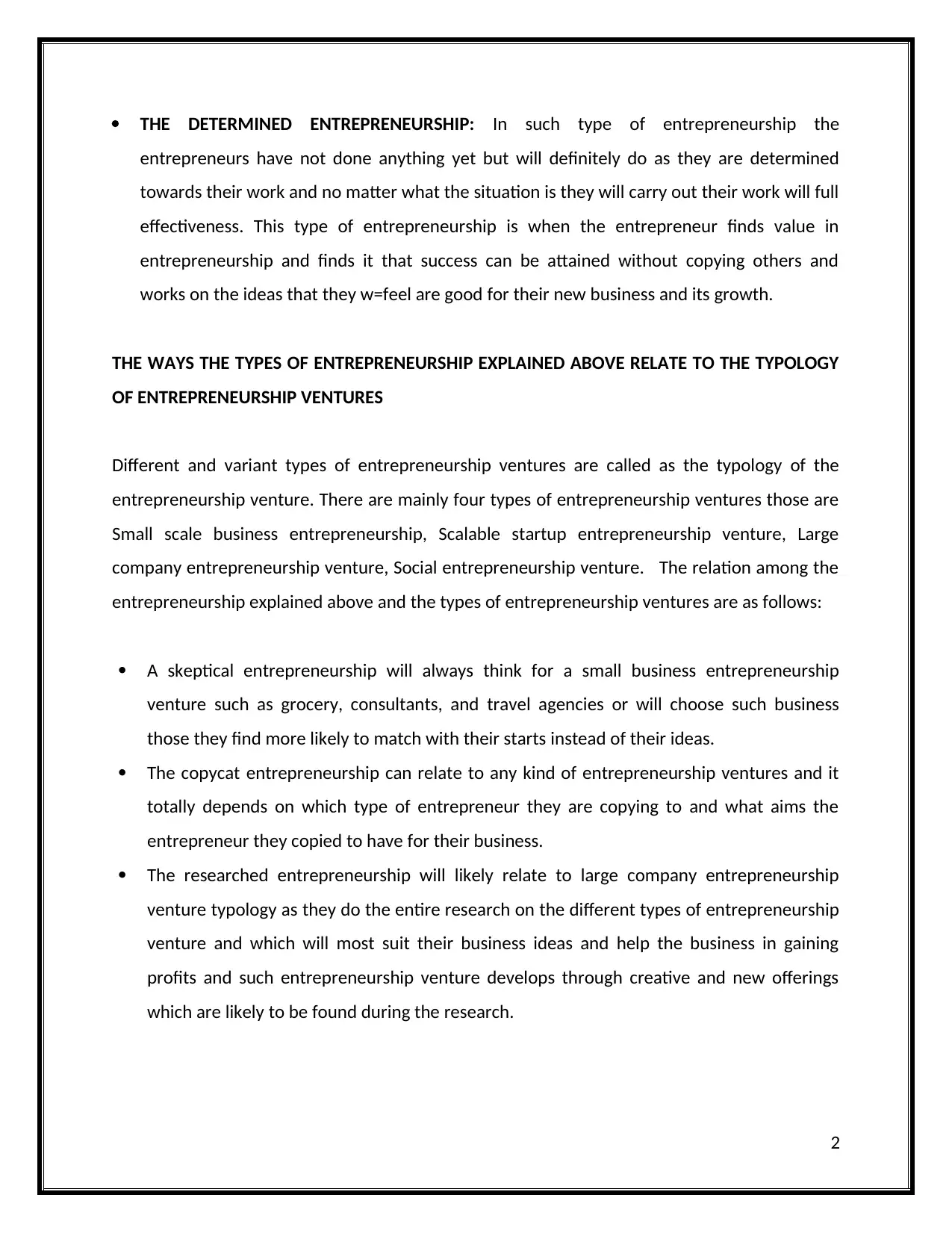
THE DETERMINED ENTREPRENEURSHIP: In such type of entrepreneurship the
entrepreneurs have not done anything yet but will definitely do as they are determined
towards their work and no matter what the situation is they will carry out their work will full
effectiveness. This type of entrepreneurship is when the entrepreneur finds value in
entrepreneurship and finds it that success can be attained without copying others and
works on the ideas that they w=feel are good for their new business and its growth.
THE WAYS THE TYPES OF ENTREPRENEURSHIP EXPLAINED ABOVE RELATE TO THE TYPOLOGY
OF ENTREPRENEURSHIP VENTURES
Different and variant types of entrepreneurship ventures are called as the typology of the
entrepreneurship venture. There are mainly four types of entrepreneurship ventures those are
Small scale business entrepreneurship, Scalable startup entrepreneurship venture, Large
company entrepreneurship venture, Social entrepreneurship venture. The relation among the
entrepreneurship explained above and the types of entrepreneurship ventures are as follows:
A skeptical entrepreneurship will always think for a small business entrepreneurship
venture such as grocery, consultants, and travel agencies or will choose such business
those they find more likely to match with their starts instead of their ideas.
The copycat entrepreneurship can relate to any kind of entrepreneurship ventures and it
totally depends on which type of entrepreneur they are copying to and what aims the
entrepreneur they copied to have for their business.
The researched entrepreneurship will likely relate to large company entrepreneurship
venture typology as they do the entire research on the different types of entrepreneurship
venture and which will most suit their business ideas and help the business in gaining
profits and such entrepreneurship venture develops through creative and new offerings
which are likely to be found during the research.
2
entrepreneurs have not done anything yet but will definitely do as they are determined
towards their work and no matter what the situation is they will carry out their work will full
effectiveness. This type of entrepreneurship is when the entrepreneur finds value in
entrepreneurship and finds it that success can be attained without copying others and
works on the ideas that they w=feel are good for their new business and its growth.
THE WAYS THE TYPES OF ENTREPRENEURSHIP EXPLAINED ABOVE RELATE TO THE TYPOLOGY
OF ENTREPRENEURSHIP VENTURES
Different and variant types of entrepreneurship ventures are called as the typology of the
entrepreneurship venture. There are mainly four types of entrepreneurship ventures those are
Small scale business entrepreneurship, Scalable startup entrepreneurship venture, Large
company entrepreneurship venture, Social entrepreneurship venture. The relation among the
entrepreneurship explained above and the types of entrepreneurship ventures are as follows:
A skeptical entrepreneurship will always think for a small business entrepreneurship
venture such as grocery, consultants, and travel agencies or will choose such business
those they find more likely to match with their starts instead of their ideas.
The copycat entrepreneurship can relate to any kind of entrepreneurship ventures and it
totally depends on which type of entrepreneur they are copying to and what aims the
entrepreneur they copied to have for their business.
The researched entrepreneurship will likely relate to large company entrepreneurship
venture typology as they do the entire research on the different types of entrepreneurship
venture and which will most suit their business ideas and help the business in gaining
profits and such entrepreneurship venture develops through creative and new offerings
which are likely to be found during the research.
2

The determined entrepreneurship will relate to scalable startup entrepreneurship ventures
as these entrepreneurship ventures are initiated keeping the vision in mind from the
starting and under it the vision is always pre-determined.
3
as these entrepreneurship ventures are initiated keeping the vision in mind from the
starting and under it the vision is always pre-determined.
3
Paraphrase This Document
Need a fresh take? Get an instant paraphrase of this document with our AI Paraphraser
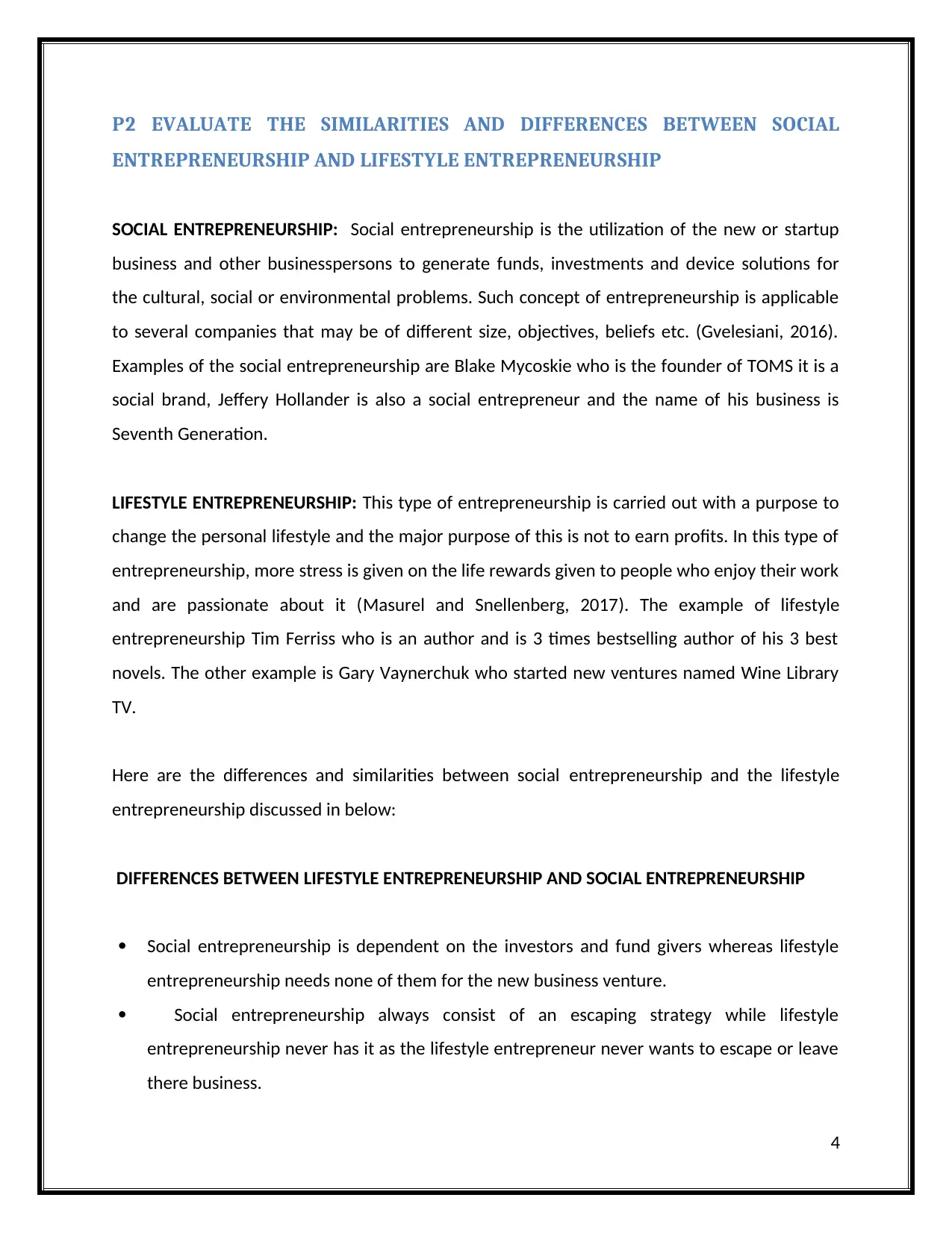
P2 EVALUATE THE SIMILARITIES AND DIFFERENCES BETWEEN SOCIAL
ENTREPRENEURSHIP AND LIFESTYLE ENTREPRENEURSHIP
SOCIAL ENTREPRENEURSHIP: Social entrepreneurship is the utilization of the new or startup
business and other businesspersons to generate funds, investments and device solutions for
the cultural, social or environmental problems. Such concept of entrepreneurship is applicable
to several companies that may be of different size, objectives, beliefs etc. (Gvelesiani, 2016).
Examples of the social entrepreneurship are Blake Mycoskie who is the founder of TOMS it is a
social brand, Jeffery Hollander is also a social entrepreneur and the name of his business is
Seventh Generation.
LIFESTYLE ENTREPRENEURSHIP: This type of entrepreneurship is carried out with a purpose to
change the personal lifestyle and the major purpose of this is not to earn profits. In this type of
entrepreneurship, more stress is given on the life rewards given to people who enjoy their work
and are passionate about it (Masurel and Snellenberg, 2017). The example of lifestyle
entrepreneurship Tim Ferriss who is an author and is 3 times bestselling author of his 3 best
novels. The other example is Gary Vaynerchuk who started new ventures named Wine Library
TV.
Here are the differences and similarities between social entrepreneurship and the lifestyle
entrepreneurship discussed in below:
DIFFERENCES BETWEEN LIFESTYLE ENTREPRENEURSHIP AND SOCIAL ENTREPRENEURSHIP
Social entrepreneurship is dependent on the investors and fund givers whereas lifestyle
entrepreneurship needs none of them for the new business venture.
Social entrepreneurship always consist of an escaping strategy while lifestyle
entrepreneurship never has it as the lifestyle entrepreneur never wants to escape or leave
there business.
4
ENTREPRENEURSHIP AND LIFESTYLE ENTREPRENEURSHIP
SOCIAL ENTREPRENEURSHIP: Social entrepreneurship is the utilization of the new or startup
business and other businesspersons to generate funds, investments and device solutions for
the cultural, social or environmental problems. Such concept of entrepreneurship is applicable
to several companies that may be of different size, objectives, beliefs etc. (Gvelesiani, 2016).
Examples of the social entrepreneurship are Blake Mycoskie who is the founder of TOMS it is a
social brand, Jeffery Hollander is also a social entrepreneur and the name of his business is
Seventh Generation.
LIFESTYLE ENTREPRENEURSHIP: This type of entrepreneurship is carried out with a purpose to
change the personal lifestyle and the major purpose of this is not to earn profits. In this type of
entrepreneurship, more stress is given on the life rewards given to people who enjoy their work
and are passionate about it (Masurel and Snellenberg, 2017). The example of lifestyle
entrepreneurship Tim Ferriss who is an author and is 3 times bestselling author of his 3 best
novels. The other example is Gary Vaynerchuk who started new ventures named Wine Library
TV.
Here are the differences and similarities between social entrepreneurship and the lifestyle
entrepreneurship discussed in below:
DIFFERENCES BETWEEN LIFESTYLE ENTREPRENEURSHIP AND SOCIAL ENTREPRENEURSHIP
Social entrepreneurship is dependent on the investors and fund givers whereas lifestyle
entrepreneurship needs none of them for the new business venture.
Social entrepreneurship always consist of an escaping strategy while lifestyle
entrepreneurship never has it as the lifestyle entrepreneur never wants to escape or leave
there business.
4
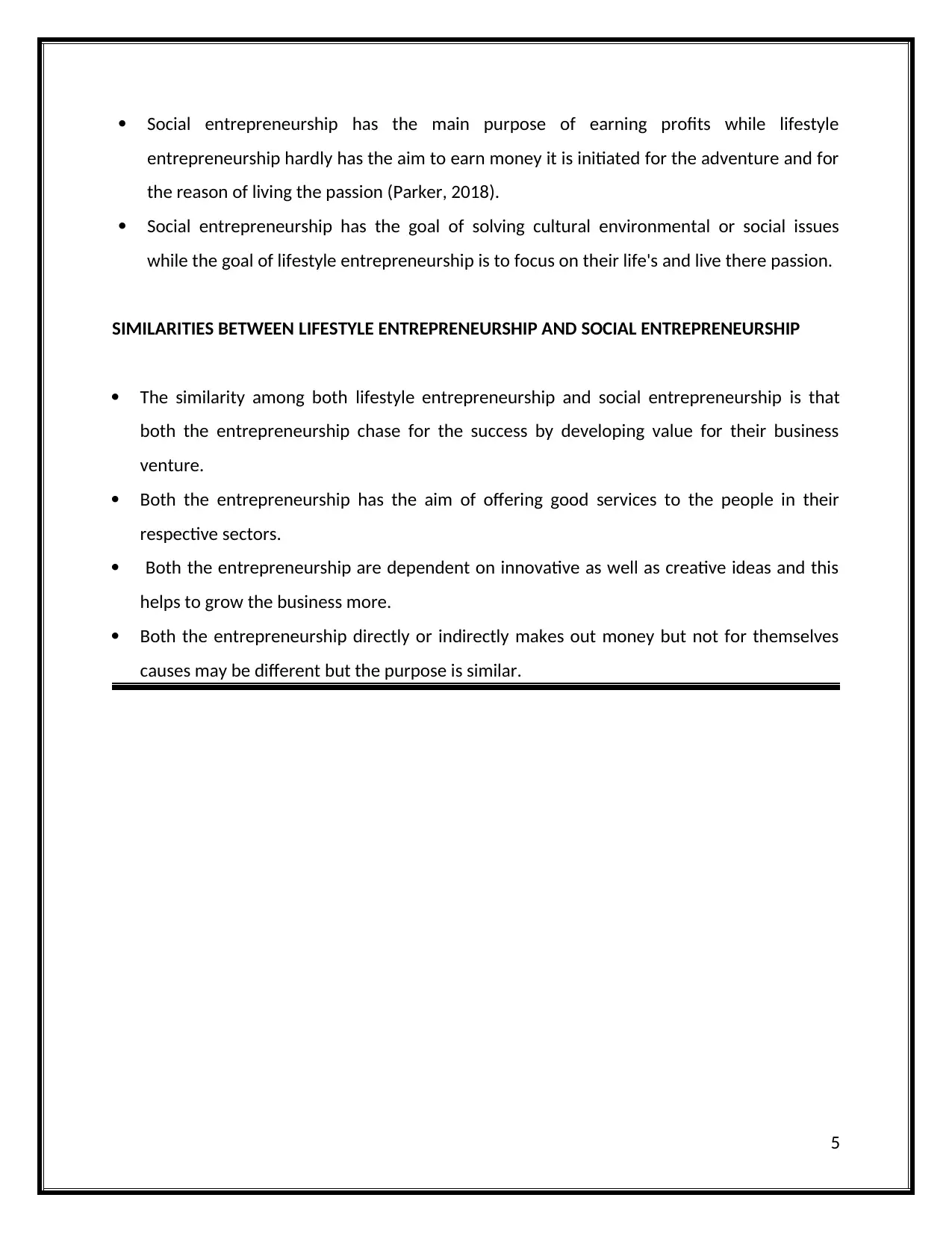
Social entrepreneurship has the main purpose of earning profits while lifestyle
entrepreneurship hardly has the aim to earn money it is initiated for the adventure and for
the reason of living the passion (Parker, 2018).
Social entrepreneurship has the goal of solving cultural environmental or social issues
while the goal of lifestyle entrepreneurship is to focus on their life's and live there passion.
SIMILARITIES BETWEEN LIFESTYLE ENTREPRENEURSHIP AND SOCIAL ENTREPRENEURSHIP
The similarity among both lifestyle entrepreneurship and social entrepreneurship is that
both the entrepreneurship chase for the success by developing value for their business
venture.
Both the entrepreneurship has the aim of offering good services to the people in their
respective sectors.
Both the entrepreneurship are dependent on innovative as well as creative ideas and this
helps to grow the business more.
Both the entrepreneurship directly or indirectly makes out money but not for themselves
causes may be different but the purpose is similar.
5
entrepreneurship hardly has the aim to earn money it is initiated for the adventure and for
the reason of living the passion (Parker, 2018).
Social entrepreneurship has the goal of solving cultural environmental or social issues
while the goal of lifestyle entrepreneurship is to focus on their life's and live there passion.
SIMILARITIES BETWEEN LIFESTYLE ENTREPRENEURSHIP AND SOCIAL ENTREPRENEURSHIP
The similarity among both lifestyle entrepreneurship and social entrepreneurship is that
both the entrepreneurship chase for the success by developing value for their business
venture.
Both the entrepreneurship has the aim of offering good services to the people in their
respective sectors.
Both the entrepreneurship are dependent on innovative as well as creative ideas and this
helps to grow the business more.
Both the entrepreneurship directly or indirectly makes out money but not for themselves
causes may be different but the purpose is similar.
5
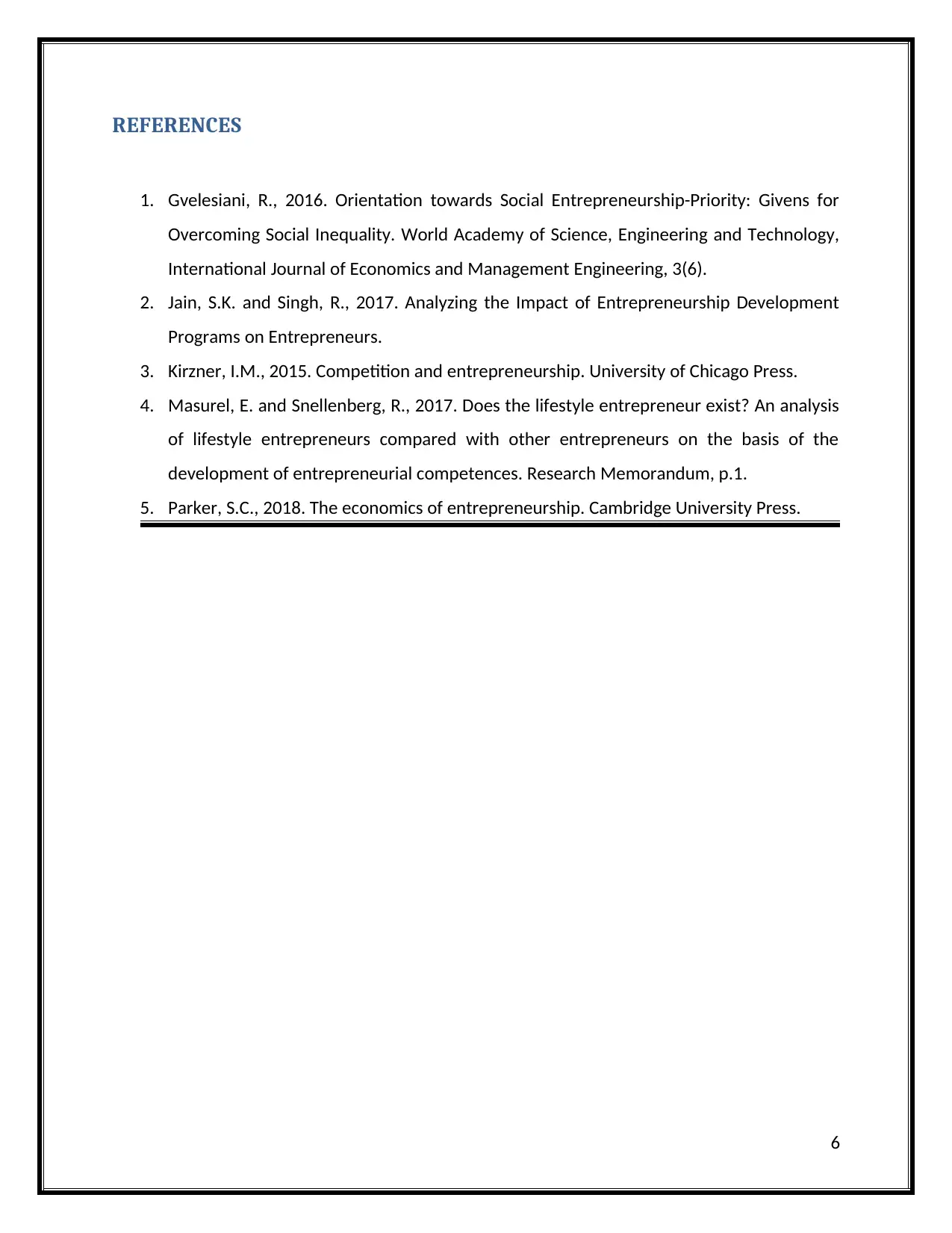
REFERENCES
1. Gvelesiani, R., 2016. Orientation towards Social Entrepreneurship-Priority: Givens for
Overcoming Social Inequality. World Academy of Science, Engineering and Technology,
International Journal of Economics and Management Engineering, 3(6).
2. Jain, S.K. and Singh, R., 2017. Analyzing the Impact of Entrepreneurship Development
Programs on Entrepreneurs.
3. Kirzner, I.M., 2015. Competition and entrepreneurship. University of Chicago Press.
4. Masurel, E. and Snellenberg, R., 2017. Does the lifestyle entrepreneur exist? An analysis
of lifestyle entrepreneurs compared with other entrepreneurs on the basis of the
development of entrepreneurial competences. Research Memorandum, p.1.
5. Parker, S.C., 2018. The economics of entrepreneurship. Cambridge University Press.
6
1. Gvelesiani, R., 2016. Orientation towards Social Entrepreneurship-Priority: Givens for
Overcoming Social Inequality. World Academy of Science, Engineering and Technology,
International Journal of Economics and Management Engineering, 3(6).
2. Jain, S.K. and Singh, R., 2017. Analyzing the Impact of Entrepreneurship Development
Programs on Entrepreneurs.
3. Kirzner, I.M., 2015. Competition and entrepreneurship. University of Chicago Press.
4. Masurel, E. and Snellenberg, R., 2017. Does the lifestyle entrepreneur exist? An analysis
of lifestyle entrepreneurs compared with other entrepreneurs on the basis of the
development of entrepreneurial competences. Research Memorandum, p.1.
5. Parker, S.C., 2018. The economics of entrepreneurship. Cambridge University Press.
6
1 out of 7
Related Documents
Your All-in-One AI-Powered Toolkit for Academic Success.
+13062052269
info@desklib.com
Available 24*7 on WhatsApp / Email
![[object Object]](/_next/static/media/star-bottom.7253800d.svg)
Unlock your academic potential
© 2024 | Zucol Services PVT LTD | All rights reserved.





